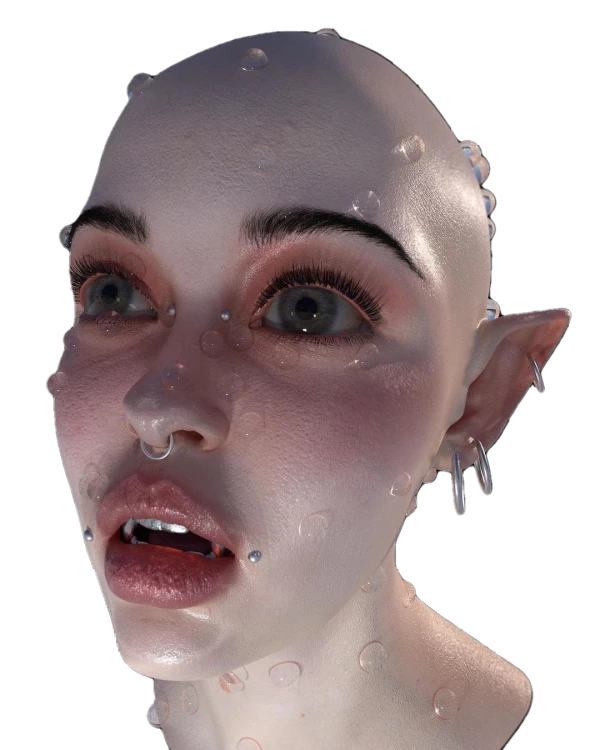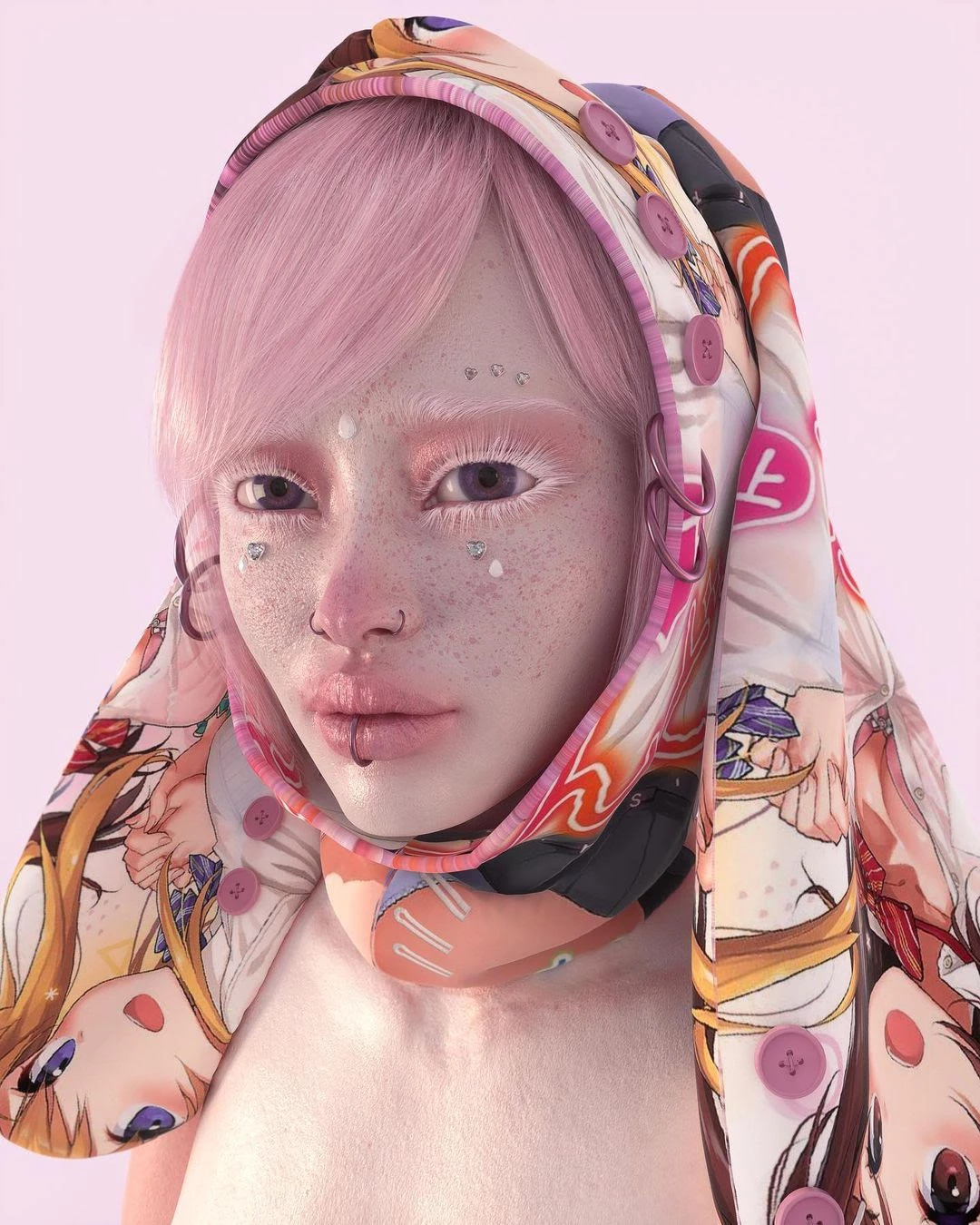

- Date
- 20 SEPTEMBER 2009
- Author
- GLORIA MARIA CAPPELLETTI
- Image by
- ARTWORK BY HARDMETACORE
- Categories
- Beauty
The future of Beauty and new forms of self-expression
From Bitcoin Loyalty Programs, NFTs, Virtual 3D Stores, and Online Games that incorporate cosmetics and hairstyles, Beauty is starting to get its own moment in the metaverse. Fashion has already been galloping more quickly than Beauty in the metaverse, with an abundance of NFTs, avatar-digital clothing, and runway displays. However already, a few beauty products, which could transform in the metaverse, have launched. This insight would result in the need for Beauty to be in sync with digital identities, or even digital humans.
The web3 is moving from interactive to immersive, from hybrid spaces such as TikTok and Twitter to fully virtual environments such as Roblox and Fortnite. The web3 internet will not be merely consumed, it will be interacted with. Therefore, what new forms of self-expression will emerge?
The Beauty industry is no stranger to this new web3 reality, and faced with this kind of market opportunity, we are seeing some really exciting new trends which are sure to fuel innovation over the next few years within the immersive world of the metaverse. Numerous major players within the Beauty and retail industries have already entered into a new science revolution. As beauty brands and retailers move into the metaverse, they are facing radically different opportunities to the frontiers of their businesses — like live-shopping, virtual runways, AR try-ons, gamification campaigns, and the digitalization of their beauty products assets.
With consumers emerging expectations of being able to interact with brands and products without physically being present in the same retail environment, there is a new science revolution that is blurring the lines between the fantastical and the real. Looking at this hyper-immersive virtual world through the lenses of beauty, AR try-ons, and virtual shopping are just some examples of how consumers are already engaging with brands and retailers within this virtual world.
Translating Beauty to the metaverse is not as easy as creating digital counterparts to products. Beauty is a touch-based industry, filled with products that people physically want to touch and smell, which makes it difficult for a metaverse, particularly with products that are not visible to the eye, like perfumes, skincare, and haircare. It seems somewhat insane that an industry such as Beauty — grounded in sensory experiences, with physical touch and care being the king — is being transformed and reinvented for a virtual world, one in which you cannot literally feel, smell, or touch the things you are looking at.
The beauty shopping experience is hyper-personal, connected with identities and self-esteem, and happens through a mixture of physical and virtual channels, which emulates a metaverse, says Audrey Depraeter-Montacel.

The metaverse is also about how physical and virtual worlds can come together to create really integrated experiences. This is one of the biggest priorities of beauty brands. If beauty brands are able to play their cards right, not only will the metaverse be enriching its consumers experiences when they engage with their own multiple identities and empowering brands, the metaverse will be a new mother lode for gold.
In addition to engaging users via the brands content, beauty brands selling makeup can use the virtual space as practice grounds for an upcoming launch. Beauty brands could use their metaverses own livestreaming in order to connect with customers and give them beauty tips, empowering messages, create a Beauty community and share a very immersive experience.
Giving brands the ability to add a layer of deeper services to their offerings, and consumers a new way to experience, appreciate, and play around with beauty products, expect to see more brands begin opening the doors of virtual stores from now on, and tempting you to NFTs. By advertising their products within the metaverse, brands may be offering NFTs as well, and this is growing. Brands can also leverage NFTs and the metaverse to extend a consumers experiences of a brand themselves. Users can virtually interact with P&G Beautys portfolio of brands via real-time, modeled content in BeautySPHERE, the first step toward a metaverse.
Other brands followed suit, including Glossier, Tatcha, and Givenchy, all of which launched activations featuring Animal Crossing, offering a space of self-expression and fascination to beauty consumers and brands alike. The beauty industry has also had a history of being fast to embrace new technologies, like AR for virtual try-ons, and beauty consumers are used to seeing these types of innovations from brands. Retailers and brands will also have to think creatively about experiences beyond just buying. In the beauty space, that might mean hosting events and live-streaming games within a VR world, or offering individualized consults and AR try-ons — all while making sure that all are seamlessly connected with existing analytics, eCommerce, and digital payments capabilities. Beauty is traditionally a tech leader, and there are great examples of experimentation with metaverses.

Cosmetics and NARS were some of the first brands to purchase NFTs and promote them within the beauty space. NARS Cosmetics has partnered now with Roblox for a fun immersive experience to play with multiple options of self-expression.
Perfect Corp announced plans to integrate cosmetics and fashion NFTs in VR try-on experiences, as well as partner with brands for the creation of AR-ready NFTs. Additionally, Perfect Corp. is also looking to democratize access to beauty and fashion VR assets, by bringing digital products from the world of the metaverse to all devices that support cameras, and creating beauty and fashion NFTs and providing fully immersive e-commerce VR try-on experiences within the metaverse.
P&G Beauty also took the plunge into the metaverse with their BeautySPHERE launch and other prominent brands including Rihannas Fenty Beauty, Glossier, Gucci, NYX, Maybelline, and Makeup Revolution are experimenting with variations of high-tech.
NFTs enable beauty and fashion brands to engage with consumers in an exciting new way via digital collectibles, which are becoming increasingly important as the world moves toward immersive experiences in the metaverse. As the retail world embraces web 3.0, digital spaces, and the metaverse, NFTs are rapidly emerging as a new revenue stream for the beauty and fashion industry.

Relevant trends can be envisioned such as emotional touchpoints, surreal colors, ethereal skin, and futuristic textures.
Both virtual idols, avatars, metahumans and metaverse concepts offer multiple, imaginable opportunities to produce content that drives the product value of the Beauty Industry. Beauty lends itself well to virtual experiences due to the experimentation and sense of play inherent to makeup. There are endless possibilities in the way that beauty brands could manifest themselves in a virtual space, because identities and experiences are stretched, says beauty futurist Alex Box.

AI-Generated text edited by Gloria Maria Cappelletti, editor in chief, RED-EYE
All artworks courtesy of HARDMETACORE
RADAR by RED-EYE is the first disclosed AI co-generated newsletter, that explores everything we need to know about the future.
